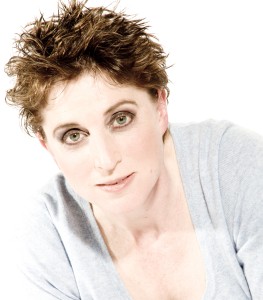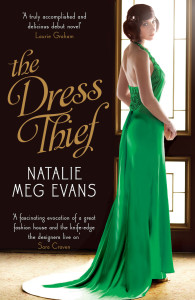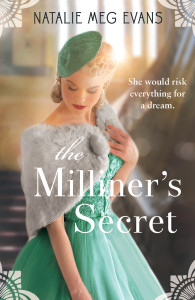
This week on Author on the Couch,
I conduct a session with
Natalie Meg Evans.
GIVEAWAY! Natalie is giving away a copy of her novel THE MILLINER’S SECRET to one person who comments on this blog.
I’m giving away a $15 Amazon Gift card to one person who signs up for my newsletter in the month of January.
Me: Tell me about an experience that had a profound impact on your life.
Natalie: It was summer 1967 and I’d had my sixth birthday. I was taken by my dad to visit family friends – the very first time I stayed away from home on my own. They had two girls, one a little older than me, the other a little younger and although their parents were kind to me, I felt rather out of things as the girls had their own set of friends. I was sometimes made a pet of, as an interesting new face. Other times, they’d all run away and leave me. The girls, Fi and Louie, each had a fluffy cat, and their home was a neat, warm, brand-new bungalow which was as unlike our ramshackle home as could be. I was very envious! A few days into my stay, their father and mother asked me to come in from the garden where we were playing, and into the kitchen. Fi and Louie wanted to join us and their parents told them sternly to go back and play in the garden. The girls refused and their mother shouted ‘Go into the garden – now!’ The girls ran off, crying and a few minutes later, one or other of the parents told me that my dad had been killed in a car crash. I don’t remember my reaction, except that I was numb. I was taken home immediately and life just descended into pain and chaos. I could never remember if I’d hugged dad before he left to go home a few days before, and the question haunted me for years.
Me: Natalie. The way you’ve written your experience–I can see it’s still very vivid in your mind. You were so young to have lost your father. I’m so sorry.
What personality trait of yours helps you most as an author?
Natalie:The ability to switch off from ‘real’ life and go into my story. Maybe I’m too ready to switch off; it’s not necessarily a useful trait for getting stuff done. It makes me forget to do normal things, but it keeps me in the zone. Being fairly obsessive and driven helps too. I worked for so long to get my first publishing contract nothing short of alien attack will keep me from writing!
Me: What personality trait of yours hinders you most as an author?
Natalie: Perfectionism, constant re-writing and editing. I drive my agent and editor crazy, always wanting ‘just one more day’ to make a finished piece more … finished.
Me: So many writers struggle with perfectionism. I know I do.
What was your high point as a writer?
Natalie: Winning the Harry Bowling Prize in the UK in 2012. It was my first validation after 26 years of writing and trying to get published. Being a Golden Heart finalist with the RWA in 2012 (that was a good year!) and being a RITA finalist last year.
Me: Congratulations on the Harry Bowling Prize, being a Golden Heart Finalist, and a RITA finalist! Those are some fine accolades!
What was your low point as a writer—a time when you questioned your path as a writer?
Natalie: More than twenty years ago, I finished my first major book, A Dark Flowering. It had  taken me three years to write, juggling a job, home and bringing up my son. I decided it was time to offer the manuscript to agents, and plucked up courage to ring one, a woman with an impressive client list. She liked the sound of what I’d written and asked me to send it to her. I was elated when she later invited me to her home in West London. We had a chat, she still liked the work and talked about who might publish it. She even talked about the sort of advance I could hope for. I was so excited. I thought I’d finally made it. She wanted some changes to the plot, and some polishing and suggested I send the novel to a professional critiquer she worked with. I did as she asked, sending the ms and a cheque for three hundred pounds to this man, money I really couldn’t afford. About a month later, back came a report like a verbal wrecking ball. It not only rubbished my novel, it was spiked through with personal, cruel observations about my presumption in daring to think I could write. The man had clearly gloried in his opportunity to inflict damage. I was devastated and the agent who’d been so excited about my future dropped me cold.
taken me three years to write, juggling a job, home and bringing up my son. I decided it was time to offer the manuscript to agents, and plucked up courage to ring one, a woman with an impressive client list. She liked the sound of what I’d written and asked me to send it to her. I was elated when she later invited me to her home in West London. We had a chat, she still liked the work and talked about who might publish it. She even talked about the sort of advance I could hope for. I was so excited. I thought I’d finally made it. She wanted some changes to the plot, and some polishing and suggested I send the novel to a professional critiquer she worked with. I did as she asked, sending the ms and a cheque for three hundred pounds to this man, money I really couldn’t afford. About a month later, back came a report like a verbal wrecking ball. It not only rubbished my novel, it was spiked through with personal, cruel observations about my presumption in daring to think I could write. The man had clearly gloried in his opportunity to inflict damage. I was devastated and the agent who’d been so excited about my future dropped me cold.
I didn’t write for two years, and for maybe five years after that my confidence would collapse halfway through anything I started. During this time, I stumbled on Julia Cameron’s ‘The Artist’s Way’ and found her inspiring. Every writer who has been hurt or humiliated should read her thoughts on those who take pleasure in bringing others down. Critics who seek to make creators ashamed of their mistakes are betraying their position. The memory still resonates when I’m asked to comment on others’ work. To hold another person’s creative expression in your hands is a huge responsibility. It should never be taken as an opportunity to be superior or cruel. I got over it, partly by visiting a hypnotherapist who got through to the wounded part of me, and by just writing until I finished something. Confidence crept back. I’m happy to say that A Dark Flowering was the novel that won the Harry Bowling Prize, and which was later renamed The Dress Thief, and went on to gain a Rita nomination. The moral? Believe in yourself, and be cautious who you invite into your writing world.
Me: Your experience is the exact reason I ask this question. We writers are delicate creatures and can be hurt so deeply by the judgements of others. It’s important to see that when we are hurt or humiliated by these terrible critiques that we are not alone, there is a way to move beyond it. Thanks for sharing your experience.
I’ve had the Artist’s Way on my To-Be-Read list forever. It’s just jumped to the top!
If you had to pick a mental disorder to have for only one day (purely for writer research purposes), which one would you choose? Why?
Natalie: Well, this is one of the more unusual questions I’ve been asked! I’ve experienced depression, not least when my husband gave up on our marriage of 23 years. I don’t want to go back to the way I felt in the weeks afterwards. I have a phobia of moths and flies, and scream if they touch me. Various of my friends now have mothers and fathers with dementia, and I get to see it close up. It’s so distressing to see fine minds reduced and it’s one of the things I fear. Will I get it, or will medicine have found a cure by the time I’m old? I sometimes wonder if I have a form of ADD, or AADD, Adult Attention Deficit Disorder because my sense of being disengaged from real life is more than a case of being ‘creative’ or ‘absent minded.’ I have made some wild decisions in my time, and can screw up simple procedures to a cosmic degree. I’m much more anchored than I used to be, but I can date that sense of being catapulted outside my own head to the moment I heard my father was dead. I don’t think I ever really climbed back into myself. Perhaps it was a form of PTSD. But to answer the question, if I had to choose any mental disorder I might cautiously opt to experience a couple of weeks in the hyper-creative state that bipolar people can reach. The great genius of Mozart, Beethoven, Oscar Wilde, Virginia Wolf, seems to be the flip side of depression. They hitch a ride on a creative slipstream and produce work that transcends the ordinary. I’d like some of that, but not the crash that comes afterwards.
Me: Bipolar mania is one of the reasons the disorder is sometimes difficult to treat. People who have it crave that kind of high–the hyper creativity–and don’t want to take the meds because it will go away. We don’t usually see them come through our doors until they’ve hit the depression stage.
Which of your characters are you most like? Why?
Natalie: Coralie de Lirac probably. A good friend asked me the other day if she was me. I hadn’t really thought about it but she probably is, to some extent. Flawed, blunt, swears a lot. She has male and female friends and adores her child. She puts her foot in it, does some pretty crass things and then feels guilty. She doesn’t face up to problems until they whack her in the face. The biggest dis-similarity is that Coralie’s braver than I am. I’m a bit ‘vanilla and magnolia’ until somebody pushes my button …
lot. She has male and female friends and adores her child. She puts her foot in it, does some pretty crass things and then feels guilty. She doesn’t face up to problems until they whack her in the face. The biggest dis-similarity is that Coralie’s braver than I am. I’m a bit ‘vanilla and magnolia’ until somebody pushes my button …
Me: You had me at “Flawed, blunt, swears a lot.” My kind of character!
How many books have you written?
Natalie: I have had three published books (my third A Gown of Thorns, is currently in edits prior to being released in the US). I must have written about five other complete novels, and uncountable false starts, tv sitcoms, film scripts. My first books took years. The Milliner’s Secret took eight months. My upcoming novel, The Wardrobe Mistress had better get written in six or I’m in trouble. The most painful part of it is just keeping going with that first draft. I love editing, particularly with a glass of wine in the evening.
Me: Tell me about your historical romance THE MILLINER’S SECRET.
By the way, your covers are gorgeous!
Natalie:
June 1940. As Paris, the City of Light, approaches its darkest hour, a young woman treads the line between survival and collaboration. Londoner Cora Masson has reinvented herself as Coralie de Lirac, using a false claim to aristocratic birth to launch herself as a fashionable milliner. When the Nazis invade, the influence of a high-ranking lover protects her business. But the cruel demands of war – and of love – cannot be kept at bay forever. Soon Coralie must find the courage to do what’s necessary to protect her friends, her freedom and everything she believes in.
Me: Share with us a favorite paragraph or two from your newest release. Why do you love this paragraph?
Natalie: I’ve chosen the passage below because I wanted to write a love scene that avoided the usual tropes of erotic writing. I got into Coralie’s head, and asked her how she really felt. Bearing in mind that she’s a girl from an ordinary London street, who happens to have been whisked away to a life of luxury in Paris – what images would she use to describe being seduced and made love to? This scene is also pivotal because it’s the moment she confesses to Dietrich, her German lover, that she is not exactly who she’s been pretending to be.
‘How do you feel?’
How did she feel? Enveloped, with Dietrich’s legs wound around her. She had a double heartbeat, or perhaps it was his adding to hers. Where had it come from, their ferocious passion? On leaving Passerine, they’d lunched in a restaurant close by, and he’d been preoccupied. She’d worried she’d let him down again by having the wrong shape head, or asking for pink hats too often. Or perhaps her ‘Prince Charming’ reference rankled still. So to return to the hotel and be flung on the bed, her clothes almost torn off, had been briefly stupefying. And then the clocks had stopped as she turned into the woman Dietrich seemed to want her to be – a creature of claws, teeth and uninhibited appetite. Sometimes dominant, sometimes yielding, discovering the power of mastery when it came to love. It was nothing to do with strength. It was in the mind, and that made it intoxicating. Best of all, there would be a next time, and a next time.
So, how did she feel? Nothing poetic offered itself, so she found images. She felt as light as beaten egg white, and weak as spinach dropped in boiling water. ‘I couldn’t walk from here to the window.’
‘I will take that as a compliment. You know that between five and seven in the evening, half of Paris is in bed together? It is the time set aside for love.’
‘Is that why the chambermaids never come tapping at the door?’
‘They may well be in bed themselves.’
‘I hope the cook isn’t. I’m starving again. That’s why I keep imagining myself as food.’
Dietrich sank his teeth gently into her shoulder. ‘You are ice cream and honey, with a skim of salt.’
‘That’s nice . . . I was thinking of myself as some kind of omelet. Can we eat early?’
‘You may order room service for yourself as I have to go out tonight.’
‘Oh, Dietrich, why?’
‘Business.’
‘Can I come too?’
A little silence. ‘Stay here and rest. Today, you seemed tired.’
‘I’ve got things on my mind. Things I have to tell you. See, I’m not exactly what you think I am.’ There, she’d said it.
Another silence. The same? Colder? Longer? ‘Go on.’
If you enjoyed this post please hit one of the handy dandy Click-to-Tweet Buttons and share it with your friends! Thank You!
[Tweet theme=”basic-border”]Craving #historical romance set in the 1940’s?Read an excerpt of THE MILLINER’S SECRET by @Natmegevans.@Abbie_Roads http://wp.me/p5h5aN-kt[/Tweet][Tweet theme=”basic-border”]Ever been crushed by a #critique? #AuthorontheCouch @Natmegevans shares her experience. Via @Abbie_Roadshttp://wp.me/p5h5aN-kt[/Tweet]
To purchase THE MILLINER’S SECRET:
You can find Natalie here:
www.facebook.com/NatalieMegEvans
Abbie Roads writes dark emotional novels featuring damaged characters, but always gives her hero and heroine a happy ending… after torturing them for three hundred pages. Her first book Race the Darkness will be out October 4th from Sourcebooks.
